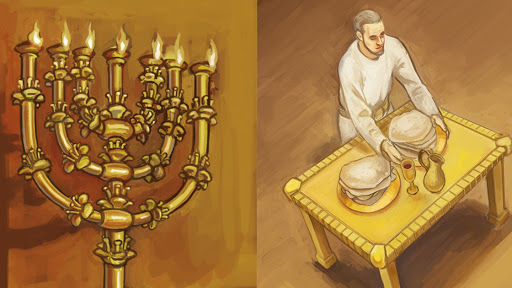Now when He came into the temple, the chief priests and the elders of the people confronted Him as He was teaching, and said, “By what authority are You doing these things? And who gave You this authority?” But Jesus answered and said to them, “I also will ask you one thing, which if you tell Me, I likewise will tell you by what authority I do these things: The baptism of John—where was it from? From heaven or from men?” And they reasoned among themselves, saying, “If we say, ‘From heaven,’ He will say to us, ‘Why then did you not believe him?’ But if we say, ‘From men,’ we fear the multitude, for all count John as a prophet.” So they answered Jesus and said, “We do not know.” And He said to them, “Neither will I tell you by what authority I do these things.” (Matt 21:23–27)
Knowing their irreformable evil, the Lord asked them an entirely rhetorical question, not that they might understand it and respond but that they should be hindered from interrogating Him further, for He had commanded, “Do not give what is holy to the dogs,” and it was not fitting that what the Lord commanded should be violated. But it would have profited them nothing, even if He had answered directly, since a darkened will cannot discern what is of the light. What good is it to show something beautiful to a blind man? Spiritual blindness consists of an evil heart, and evil people are not able to understand the mystery of devotion any more than the blind can gaze upon the splendor of the light. When a stealthy hunter sees a place to dig a trap, he also raises a net adjacent to it so that wherever the prey he is seeking to capture attempts to flee, it will either be caught in the net or fall into the pit. Likewise, the Lord set a trap for the chief priests and elders by means of His simple question, in such a way that if they professed John to have come from heaven, He would be able to ask them, “Why, then, did you not believe him?” But if they replied that John was of the world, they would thereby have run into the danger of being stoned to death by the people, as though fleeing into a hunter's trap. It was proper that the Lord teach His interrogator and weaken his tempter in whatever way He could and confound the cleverness of his reproach with rational arguments, while not making known the truth of His own mystery. The Lord did virtually the same thing elsewhere to the devil, who had cited against him a scriptural text without understanding it: “For it is written, ‘He will command His angels concerning you, and they will hold you in their hands, lest your foot stumble on a rock.’” The Lord did not respond, “That is not what this Scripture means.” Rather, He left the devil ignorant of the true meaning of the text and instead refuted him with another, clearer passage from Scripture in order to confound the devil's arrogance without revealing the prophetic mystery.
Knowing their irreformable evil, the Lord asked them an entirely rhetorical question, not that they might understand it and respond but that they should be hindered from interrogating Him further, for He had commanded, “Do not give what is holy to the dogs,” and it was not fitting that what the Lord commanded should be violated. But it would have profited them nothing, even if He had answered directly, since a darkened will cannot discern what is of the light. What good is it to show something beautiful to a blind man? Spiritual blindness consists of an evil heart, and evil people are not able to understand the mystery of devotion any more than the blind can gaze upon the splendor of the light. When a stealthy hunter sees a place to dig a trap, he also raises a net adjacent to it so that wherever the prey he is seeking to capture attempts to flee, it will either be caught in the net or fall into the pit. Likewise, the Lord set a trap for the chief priests and elders by means of His simple question, in such a way that if they professed John to have come from heaven, He would be able to ask them, “Why, then, did you not believe him?” But if they replied that John was of the world, they would thereby have run into the danger of being stoned to death by the people, as though fleeing into a hunter's trap. It was proper that the Lord teach His interrogator and weaken his tempter in whatever way He could and confound the cleverness of his reproach with rational arguments, while not making known the truth of His own mystery. The Lord did virtually the same thing elsewhere to the devil, who had cited against him a scriptural text without understanding it: “For it is written, ‘He will command His angels concerning you, and they will hold you in their hands, lest your foot stumble on a rock.’” The Lord did not respond, “That is not what this Scripture means.” Rather, He left the devil ignorant of the true meaning of the text and instead refuted him with another, clearer passage from Scripture in order to confound the devil's arrogance without revealing the prophetic mystery.
Incomplete Work on Matthew, Homily 39






